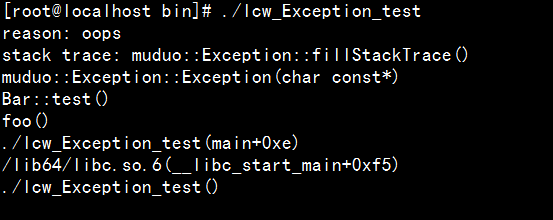Exception类是为异常捕获而设计,可以获得异常的信息以及栈的回溯信息
(原来的代码没有demangle成员函数,输出的格式比较难看,加了demangle成员函数,利用demangle成员函数可以转换格式,使得输出的格式更加接近我们的习惯)
以下的代码是加入了demangle成员函数后的:
Exception.h
// Use of this source code is governed by a BSD-style license
// that can be found in the License file.
//
// Author: Shuo Chen (chenshuo at chenshuo dot com)
#ifndef MUDUO_BASE_EXCEPTION_H
#define MUDUO_BASE_EXCEPTION_H
#include <muduo/base/Types.h>
#include <exception>
namespace muduo
{
class Exception : public std::exception
{
public:
//避免隐式调用
explicit Exception(const char* what);//两个构造函数
explicit Exception(const string& what);
//虚函数
virtual ~Exception() throw();//析构
virtual const char* what() const throw();//异常信息
const char* stackTrace() const throw();//栈回溯信息
private:
void fillStackTrace();
string demangle(const char* symbol);//添加一个成员函数转换一下栈回溯信息输出的格式
string message_;//保存异常信息的字符串
string stack_;//保存栈回溯信息的字符串
};
}
#endif // MUDUO_BASE_EXCEPTION_H
Exception.cc
// Use of this source code is governed by a BSD-style license
// that can be found in the License file.
//
// Author: Shuo Chen (chenshuo at chenshuo dot com)
#include <muduo/base/Exception.h>
#include <cxxabi.h>
#include <execinfo.h>
#include <stdlib.h>
#include <stdio.h>
using namespace muduo;
Exception::Exception(const char* msg) : message_(msg)
{
fillStackTrace();//构造函数直接调用 fillStackTrace
}
Exception::Exception(const string& msg) : message_(msg)
{
fillStackTrace();
}
Exception::~Exception() throw ()
{
}
const char* Exception::what() const throw()
{
return message_.c_str();
}
const char* Exception::stackTrace() const throw()
{
return stack_.c_str();
}
void Exception::fillStackTrace()
{
const int len = 200;
void* buffer[len];//保存200个地址,是一个数组的指针
//栈回溯,保存各个栈帧的地址
//buffer中的每一个项都是void*,用于保存函数的地址
int nptrs = ::backtrace(buffer, len);//nptr为实际保存的个数
//根据地址,转成相应的函数符号
char** strings = ::backtrace_symbols(buffer, nptrs);//指向的是指针数组
if (strings)
{
for (int i = 0; i < nptrs; ++i)//遍历信息
{
// TODO demangle funcion name with abi::__cxa_demangle
//stack_.append(strings[i]);//将信息保存到stack_字符串
stack_.append(demangle(strings[i]));//转化后在存入
stack_.push_back('
');
}
free(strings);//存放的地址使用malloc开辟出来的,需要我们自己释放
}
}
//该函数实现栈回溯信息的格式转换
string Exception::demangle(const char* symbol)
{
size_t size;
int status;
char temp[128];
char* demangled;
//first, try to demangle a c++ name
if (1 == sscanf(symbol, "%*[^(]%*[^_]%127[^)+]", temp)) {
if (NULL != (demangled = abi::__cxa_demangle(temp, NULL, &size, &status))) {
string result(demangled);
free(demangled);
return result;
}
}
//if that didn't work, try to get a regular c symbol
if (1 == sscanf(symbol, "%127s", temp)) {
return temp;
}
//if all else fails, just return the symbol
return symbol;
}
以下是一个简单的测试函数:
//Exception类测试函数
#include <muduo/base/Exception.h>
#include <stdio.h>
//定义Bar类
class Bar
{
public:
void test()
{
throw muduo::Exception("oops");//抛出异常
}
};
void foo()
{
Bar b;
b.test();
}
int main()
{
try
{
foo();//可能发生异常
}
catch (const muduo::Exception& ex)//捕获异常
{
printf("reason: %s
", ex.what());//抛出异常信息
printf("stack trace: %s
", ex.stackTrace());//把异常栈回溯信息抛出,即在哪里抛出异常,打印函数的调用栈
}
}
单独编译后运行结果如下:(没有使用demangle成员函数)

使用demangle成员函数:
